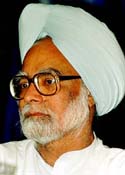Commentary/Mani Shankar Aiyar
In the electoral marketplace, the greatest achievement of the Rao government proved to be an uncashable
cheque
The Socialism of the Congress was never doctrinaire. It
was never an imported Marxist myth. The 'mixed economy'
was the mantra; there was never anything sacrosanct about the
mix itself. That is why it was wholly inappropriate to describe
the Rao-Manmohan initiative as a 'new' economic policy.
It was a new phase of an old economic policy, the logic of which
had been written into the Avadi strategy.
Yet, the semantic consequence
was to drive the word 'socialism' out of the Congress
vocabulary -- and leave us open to the charge that we were more
concerned with the 200 million Indians in the market than the
700 million outside the market's pale. Notwithstanding the fact
that the Rao-Manmohan policy set aside more finances for the poor
than ever before -- a veritable exponential quantum leap in resources
for employment assurance and poverty elimination -- the deletion
of 'socialism' from our vocabulary and the projection
of the 'new' economic policy as a break from the past
made sense only in the marketplace where the privileged Indian
foregathers.
In the electoral marketplace, the single-greatest
achievement of the Rao government proved to be a virtually uncashable
cheque.
 Also, the abandonment of political priority to Panchayati Raj
meant that there was no mechanism to deliver anti-poverty programmes
to the poor. It was state governments and the entrenched bureaucracy
that fattened on the good intentions of Rao and Manmohan Singh.
The bottom line of Congress socialism has always been priority
to the poor; the substantive consequence of the Congress abandoning
the vocabulary of socialism is that the poor-- who are the true
bahujan samaj -- are left wondering what's in it for them.
I would have redesignated Manmohan as minister of poverty eradication.
Also, the abandonment of political priority to Panchayati Raj
meant that there was no mechanism to deliver anti-poverty programmes
to the poor. It was state governments and the entrenched bureaucracy
that fattened on the good intentions of Rao and Manmohan Singh.
The bottom line of Congress socialism has always been priority
to the poor; the substantive consequence of the Congress abandoning
the vocabulary of socialism is that the poor-- who are the true
bahujan samaj -- are left wondering what's in it for them.
I would have redesignated Manmohan as minister of poverty eradication.
Finally, Non-alignment. For us, the world has not changed.
The Berlin Wall never stood between us and our aspirations. Its
fall has not altered our primary foreign policy objective of resisting
the quest of others for domination over us. Terminologically,
non-alignment is necessarily part of the vocabulary of the alignments
of the Cold War. The semantic task is to align the vocabulary
of independence in external affairs to the idiom of the present.
Substantively, standing up to the quest for dominance, as we
have been doing over the CTBT in Geneva, remains at the heart
of foreign policy.
If the Congress is able to rejuvenate itself ideologically, the
country will itself discover how much India needs the Congress;
if we remain stuck in old grooves or abandon ideology for expediency
then, perhaps, the fate of the Liberals will -- should? -- overtake
us.
|



 Also, the abandonment of political priority to Panchayati Raj
meant that there was no mechanism to deliver anti-poverty programmes
to the poor. It was state governments and the entrenched bureaucracy
that fattened on the good intentions of Rao and Manmohan Singh.
The bottom line of Congress socialism has always been priority
to the poor; the substantive consequence of the Congress abandoning
the vocabulary of socialism is that the poor-- who are the true
bahujan samaj -- are left wondering what's in it for them.
I would have redesignated Manmohan as minister of poverty eradication.
Also, the abandonment of political priority to Panchayati Raj
meant that there was no mechanism to deliver anti-poverty programmes
to the poor. It was state governments and the entrenched bureaucracy
that fattened on the good intentions of Rao and Manmohan Singh.
The bottom line of Congress socialism has always been priority
to the poor; the substantive consequence of the Congress abandoning
the vocabulary of socialism is that the poor-- who are the true
bahujan samaj -- are left wondering what's in it for them.
I would have redesignated Manmohan as minister of poverty eradication.